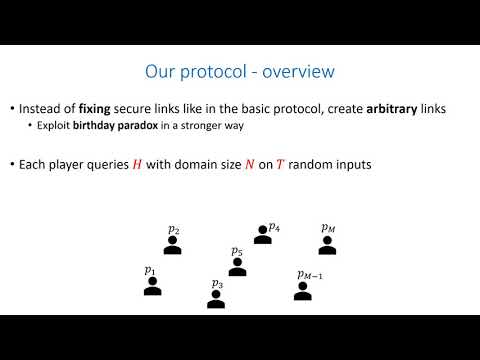CryptoDB
Distributed Merkle's Puzzles
| Authors: | |
|---|---|
| Download: | |
| Abstract: | Merkle's puzzles were proposed in 1974 by Ralph Merkle as a key agreement protocol between two players based on symmetric-key primitives. In order to agree on a secret key, each player makes $T$ queries to a random function (oracle), while any eavesdropping adversary has to make $\Omega(T^2)$ queries to the random oracle in order to recover the key with high probability. The quadratic gap between the query complexity of the honest players and the eavesdropper was shown to be optimal by Barak and Mahmoody [CRYPTO`09]. We consider Merkle's puzzles in a distributed setting, where the goal is to allow \emph{all} pairs among $M$ honest players with access to a random oracle to agree on secret keys. We devise a protocol in this setting, where each player makes $T$ queries to the random oracle and communicates at most $T$ bits, while any adversary has to make $\Omega(M \cdot T^2)$ queries to the random oracle (up to logarithmic factors) in order to recover \emph{any one} of the keys with high probability. Therefore, the amortized (per-player) complexity of achieving secure communication (for a fixed security level) decreases with the size of the network. Finally, we prove that the gap of $T \cdot M$ between the query complexity of each honest player and the eavesdropper is optimal. |
Video from TCC 2021
BibTeX
@article{tcc-2021-31509,
title={Distributed Merkle's Puzzles},
booktitle={Theory of Cryptography;19th International Conference},
publisher={Springer},
doi={10.1007/978-3-030-90453-1_11},
author={Itai Dinur and Ben Hasson},
year=2021
}

